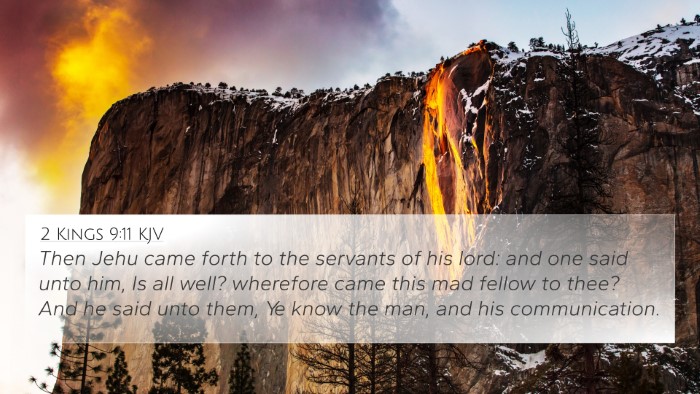Understanding Matthew 11:18
Matthew 11:18 states:
"For John came neither eating nor drinking, and they say, He hath a devil."
This verse highlights the criticism faced by John the Baptist and contrasts his lifestyle with that of Jesus. Below is a summary of the verse's meaning based on insights from various public domain commentaries.
Contextual Overview
In this chapter of Matthew, Jesus speaks about the reception of John the Baptist and His own ministry. The verse captures the societal attitudes towards these two figures and how their different lifestyles led to different forms of critique and misunderstanding.
Matthew Henry's Commentary
Matthew Henry emphasizes that John the Baptist's ascetic lifestyle was a deliberate choice meant to symbolize repentance and a call to holiness. Yet, despite his intentions, he was mocked by some as being possessed. This reflects the deeper spiritual blindness prevalent in the hearts of the people. Henry points out that the judgment against John reveals a prevalent hypocrisy; what was right in God's eyes was dismissed by men.
Albert Barnes' Commentary
Albert Barnes offers insights into the significance of John's fasting and abstaining from drinking. He notes that these actions were intended to draw people closer to God, yet they resulted in derision. This paradox illustrates a tendency of the people to dismiss sincere efforts towards godliness when they diverged from societal norms. Barnes' perspective emphasizes the danger of societal opinion and the challenge that true messengers of God face.
Adam Clarke's Commentary
Adam Clarke expands on the implications of the phrase “he hath a devil,” explaining that this claim was an attempt to discredit John’s authority and message. Clarke argues that such accusations often arise when truth addresses the complacency of sin. His commentary mentions that John’s disdain for worldly indulgences put him at odds with those who valued societal customs over spiritual truths.
Thematic Connections
This verse connects with various themes in Scripture, encapsulating the challenges of prophetic ministry and the rejection of divine truth. Below are some related themes and the corresponding Bible verses:
- Prophetic Rejection: Luke 7:33-34 - "For John the Baptist came neither eating bread nor drinking wine; and ye say, He hath a devil." This parallels Matthew 11:18 in its acknowledgment of how John was perceived.
- Fasting and Asceticism: Isaiah 58:3-5 - These verses address the true purpose of fasting, indicating that mere abstention is insufficient without accompanying righteousness.
- Suffering for Righteousness: Matthew 5:10 - "Blessed are those who are persecuted for righteousness' sake, for theirs is the kingdom of heaven." John's experience reflects this beatitude.
- The Role of Prophets: Jeremiah 20:7-9 - Jeremiah faced similar scorn for speaking God's truth, underlining a pattern found throughout Biblical history.
- Jesus' Ministry and Acceptance: John 1:11 - "He came to his own, and his own received him not," which echoes the rejection theme seen in Matthew 11:18.
- The Comparison of Messengers: 1 Corinthians 4:9 - Paul speaks of apostles as being spectacles to the world, facing ridicule similar to that of John.
- The Call to Repentance: Acts 3:19 - "Repent therefore, and turn back, that your sins may be blotted out," highlighting the necessity of the message that both John and Jesus brought.
- Doctor and Health: Luke 5:31 - "Jesus answered them, 'It is not the healthy who need a doctor, but the sick.'" This emphasizes the need for repentance and the role of a messenger in leading people back to health.
- Compromise and Truth: Galatians 1:10 - Paul speaks of pleasing people versus God, akin to how John was dismissed by those who adhered to social norms.
- Truth Revealed Through Actions: James 2:18 - "Show me your faith without deeds, and I will show you my faith by my deeds," a theme resonating with the actions of both John and Jesus.
Conclusion
Matthew 11:18 serves as a poignant reminder of the strife that truth bearers face in a world often hostile to godliness. By examining John the Baptist's rejection alongside Jesus' ministry, we glean valuable insights into the nature of prophetic missions and the intricate connections between Biblical figures. Through various cross-references, we can appreciate the deeper narrative of God's persistent call for repentance and authenticity in faith.
Further Study Tools
For those looking to delve deeper into the connections between Bible verses, consider utilizing:
- Bible Concordance: A helpful tool for locating and cross-referencing various scriptures.
- Bible Cross-Reference Guide: This can aid in thematic studies and understanding the context of related verses.
- Cross-Reference Bible Study Methods: Various methods can enhance the depth of personal Bible study, ensuring a well-rounded understanding of themes.
- Bible Reference Resources: These can provide comprehensive insights into intricate Biblical narratives.
- Bible Chain References: Following thematic chains can illuminate the overarching story of salvation and prophecy in Scripture.
Using Cross-References Effectively
To effectively find cross-references in the Bible, consider the following strategies:
- Identify Key Themes: Start by settling on particular themes or topics you wish to explore.
- Use Cross-Reference Systems: Leverage study Bibles or concordances that provide structured links between verses.
- Compare Similar Passages: Look for verses that cover similar subjects or events, as illustrated above.
- Engage with Commentary: Commentaries can provide crucial insights into how particular verses connect or contrast with others.
- Participate in Group Studies: Discussing passages with others can unveil fresh perspectives and insights.
Conclusion of Theme Analysis
In summary, the criticisms faced by John the Baptist in Matthew 11:18 serve as a profound reflection on how truth can provoke varied responses based on societal norms and spiritual receptivity. The connections drawn with other Biblical passages can enrich one's understanding of this verse and contribute to a wider appreciation of inter-Biblical dialogue. As we continue to explore these connections, we gain greater insight into the purpose of God's messengers and the transformative power of their messages.















